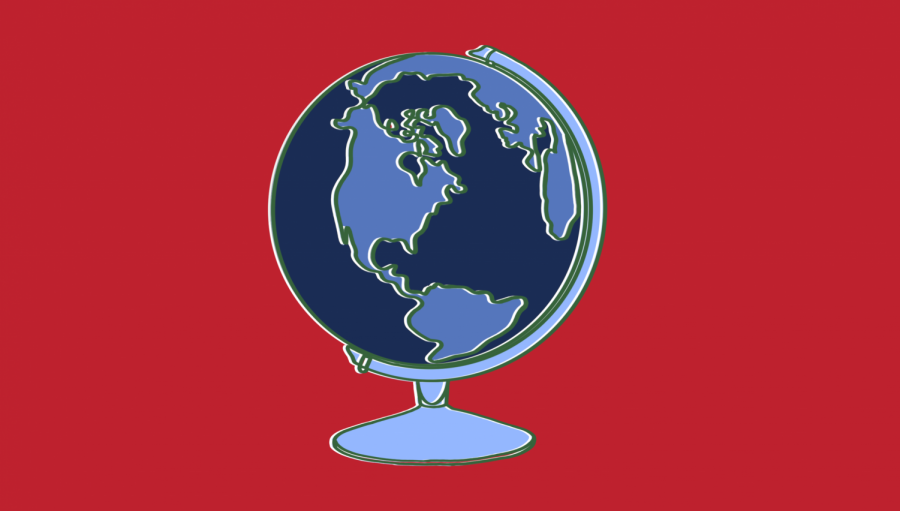Global Recap: Migrant crisis at Poland’s border continues, Russian-Ukraine tensions overview
December 1, 2021
There is no shortage of newsworthy topics here in the United States. At times it is easy to get lost in it all, but equally crucial things happen all over the world.
They can shed light on political relationships, on humanitarian issues and keep you up to date on global events.
These global headlines are complex. It is highly encouraged to follow the links to the stories provided and read the story in its entirety.
Here is a quick look at some global events that made the news the last two weeks.
Migrant crisis at Poland-Belarus border is far from over
The migrant crisis on the border of Belarus and Poland requires a coordinated response by the European Union, a EU official said last Tuesday, according to Reuters.
The bloc said it stands with Poland, Lithuania and Latvia who are bearing the most effects of the migrants attempting to enter western Europe, according to the article.
“It is the EU as a whole that is being challenged,” Ursula von der Leyen, president of the EU commission, said. “This is not a migration crisis. This is the attempt of an authoritarian regime to try to destabilise its democratic neighbours.”
The Polish prime minister said diplomatic talks have lessened the migrant issue, but they warn the crisis is still ongoing, Reuters reports.
As of Monday, more than 100 migrants have been flown back to their home countries, with the help of Belarus, to get the proper paperwork, according to the Associated Press.
Belarusian President Alexander Lukashenko denied the accusation made by the EU that he is pushing the migrants into the EU to destabilize it as retaliation for the sanctions imposed on the country by the EU, AP reports.
Russia-Ukraine conflict overview
As of Nov. 20, 92,000 Russian troops have amassed near Ukraine’s border, according to Military Times.
The Ukraine defense intelligence agency said Russian forces could attack as early as January or early February, according to the article.
In a Reuters article, many familiar with the Kremlin said an invasion of Ukraine is not likely imminent.
Russia denies any aggressions and said they can move troops within their borders as they see fit, Reuters reports.
They accused NATO of whipping up regional tensions to acquire regions that have been pro-Russia since 2014, according to the article.
Though Ukraine is significantly more militarily equipped than when Russia annexed Crimea, Russia does have more active military members compared to Ukraine’s 209,000, according to Reuters.
“For Ukraine, the issue would be … to resist as much as they can, pray for assistance from the West, and ultimately fight back,”Mathieu Boulegue, a research fellow at London’s Chatham House think-tank, said. “If Russia invades in full, the question for Kyiv will be to mount counter-insurrection-style warfare to make the cost of invasion tremendous for Russia.”
Forty-five people killed in a bus crash in western Bulgaria
At least 45 people, including 12 children, were killed after a bus caught fire and crashed last Tuesday, according to the New York Times.
The bus went off the highway near a village in western Bulgaria.
The driver was also among the casualties of the accident, New York Times reports.
The cause of the fire is unknown. It is unknown if the bus crashed before or after catching fire, BBC reports.
The bus was registered in Macedonia and most passengers were returning from their trip to Istanbul, according to the BBC.
“It is a terrible tragedy because many of them are children,” Prime Minister Zoran Zaev said, adding that he had spoken to one of the injured who had managed to break a window of the bus and help several people escape. “He explained that they were sleeping on the bus when a loud explosion was heard.”
Sudanese prime minister reinstated and takes deal to end bloodshed
The Sudanese Prime Minister Abadalla Hamdok was reinstated to lead the government, according to Reuters.
Hamdok was one of the leaders deposed during the military coup of the country last month, according to a CNN article.
He took the deal to avoid more bloodshed as the protests have become increasingly violent, according to the article. Around 40 people have been killed in the protests.
“There are so many people dying on the streets … so the Prime Minister had to take this step and accept the humiliation,” Mudawi Ibrahim, a prominent official in the National Forces Initiative, said.
The deal reinstated Hamdok as the prime minister and also set up the Council of Ministers, a council disbanded on Oct. 25, according to CNN.
The deal was rejected by the Sudan’s Forces of Freedom and Change Coalition saying there was no negotiation, according to the article.
A new government is expected to be set up soon, Reuter reports.
Greece the newest EU country to mandate COVID vaccinations
Two nations in the EU are fining citizens who have not received COVID-19 vaccinations, according to NPR.
Greece announced Tuesday that everyone over 60 must schedule their vaccination appointment by Jan. 16 or face monthly fines of 100 euros a month.
The money collected through these fines will go toward the Greece health system that has been hit hard by the increased hospital demands, a BBC article states.
“Greeks over the age of 60… must book their appointment for a first jab by January 16,” the premier said in a statement to the cabinet. “Their vaccination is henceforth compulsory.”
The measure has yet to be put to a parliamentary vote, but lawmakers are expected to approve the measure, BBC states.
“It’s not a punishment,” Greek Prime Minister Kyriakos Mitsotakis told his cabinet in a televised meeting. “I would say it is the price for health. It is also an act of justice for the vaccinated. It’s not right that they are deprived of health care services because others stubbornly refuse to do the obvious.”
New COVID-19 variant could displace the Delta variant as most contagious
A new COVID-19 variant, named Omicron, was discovered in Southern Africa that could outpace the Delta variant according to some scientists, Reuters reports.
The World Health Organization said this new variant could cause surges in infection rates.
“We thought, what will outcompete Delta? That has always been the question, in terms of transmissibility at least, … perhaps this particular variant is the variant,” Adrian Puren, acting executive director of South Africa’s National Institute for Communicable Diseases, told Reuters.
The discovery of the Omicron variant has caused global alarm as many countries are again restricting travel to that part of Africa.
Scientists studying the new variant are worried that the new variant could possibly be transmitted even among vaccinated individuals, according to Reuters.
The WHO, in a tweet, released an overview of what is known about the potentially dangerous new variant.
News reporter Michael Crimmins can be reached at michael.crimmins416@topper.wku.edu. Follow him on Twitter @michael_crimm












